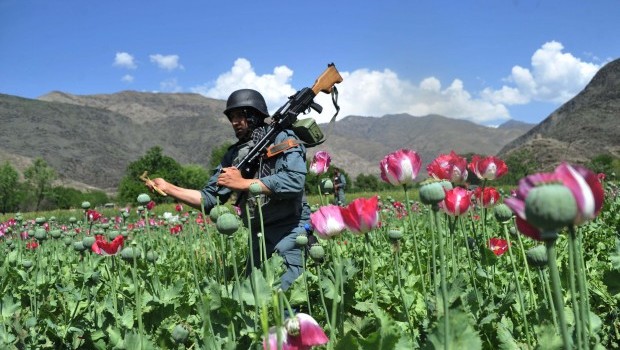
An Afghan security force member destroys poppy fields in the Noor Gal district of eastern Kunar province on April 13, 2013. Source: AFP Photo/Noorullah Shirzada
Vienna, Reuters—Afghan farmers attracted by high prices are likely to cultivate more opium this year, lining the pockets of traffickers and Taliban insurgents alike, a UN report said on Monday.
Afghanistan supplies about 90% of the world’s opium, from which heroin is made, and its poppy-driven economy is helping to fuel the 12-year-long war.
Experts say uncertainty over the future after most foreign forces withdraw from Afghanistan by the end of 2014 could help cause a surge in opium growth as a means of generating cash.
The United Nations Office on Drugs and Crime (UNODC) said its latest report indicated a “strong association” between insecurity, lack of agricultural aid, and opium cultivation.
Villages with poor security and those which had not received agricultural help were much more likely to grow poppies in 2013 than those with good security and those which had received aid, it said.
Twelve provinces were forecast to show a rise in opium cultivation this year, according to the report by the Vienna-based UNODC and Afghanistan’s Ministry of Counter Narcotics.
They included the southern provinces of Kandahar and Helmand—strongholds of the Taliban-led insurgency. This would follow a low yield last year caused by poppy disease and bad weather.
Helmand was expected to remain the biggest cultivating province.
“Opium prices, albeit lower than in 2010 and 2011, were still at a much higher level than between 2005 and 2009 making opium cultivation financially very attractive for farmers,” the report said.
Three provinces—Balkh, Faryab and Takhar—may lose their poppy-free status unless effective eradication took place, the report said. Cultivation was forecast to decline in one province, Herat, and no major changes were foreseen in seven, including Kabul.
The report, Afghanistan Opium Risk Assessment 2013, called it a “worrying situation.”
“Poppy cultivation is not only expected to expand in areas where it already existed in 2012 … but also in new areas or in areas where poppy cultivation was stopped,” it said.
With foreign combat forces leaving in less than two years, and with much of their cash and air power expected to go with them, the Afghan government will need more help fighting poppy cultivation, experts say.
The UNODC in 2011 estimated the opium trade may have earned the Taliban USD 700 million, up from USD 200 million a year in the previous decade, with traffickers earning billions more.
